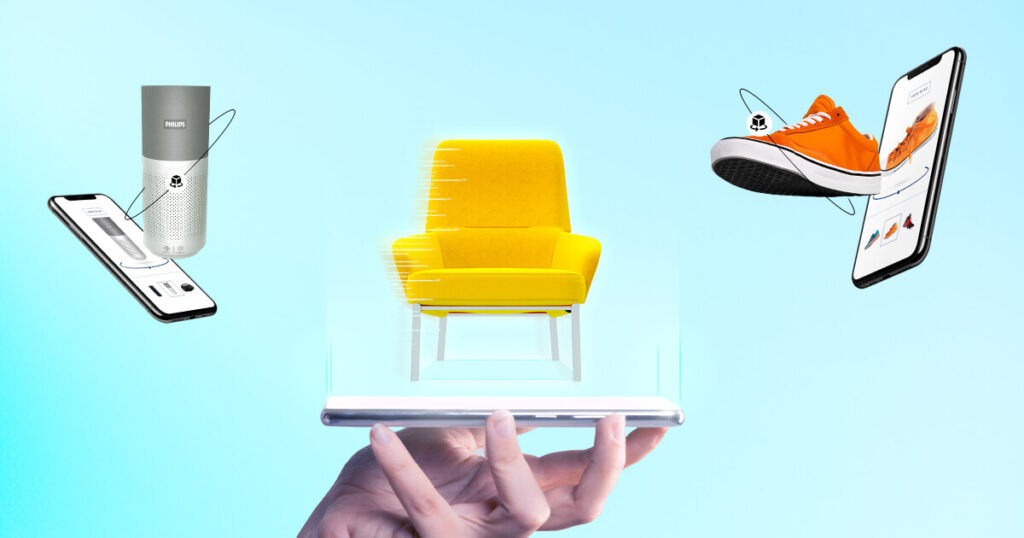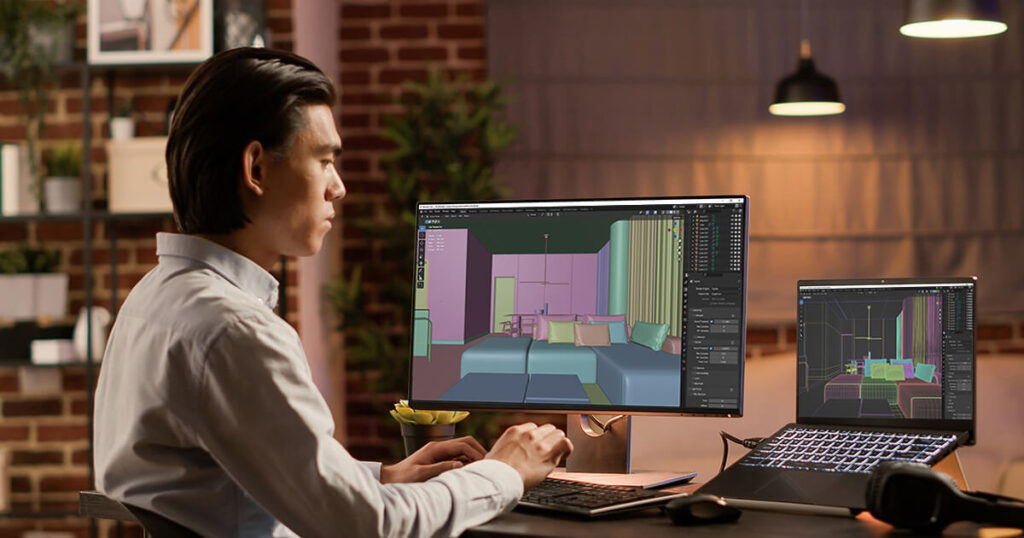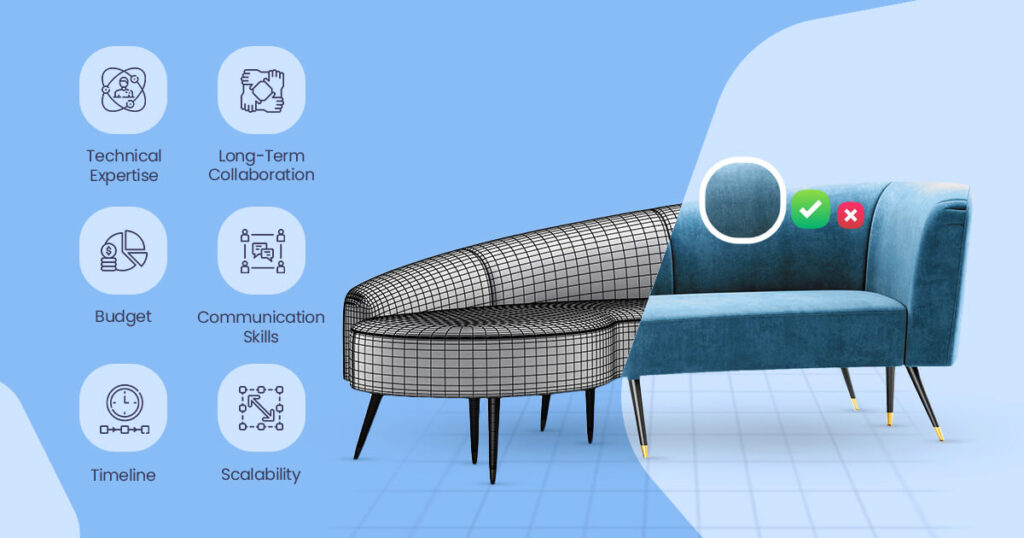3D visualization provides companies with an outstanding way of showing furniture. Visitors use virtual reality headsets to sit on a sofa or walk around a table. They feel the magic spell while shopping.
On the screen, businesses show many different designs and quality of furniture. Customers get very excited seeing the spinning chairs and changing colors. They can choose their favorite one easily. When they are happy, they want to buy more. Further, the screen shows products within a limited space. So, businesses can use the extra space for other things or save money.
So, by the Power of 3D Visualization in Furniture Trade Shows, helps grow businesses and earn more profit. Let’s learn the impact and benefits of using this model in the furniture trade.
The Impact of 3D Visualization at Furniture Trade Shows
In today’s world, people love to see things in 3D. It feels closer to real life. In the furniture industry, where companies show off their new products. The 3D models have made an alluring difference here.
Before, customers only saw pictures or 2D drawings of furniture. It was not clear how they would fit, be comfortable and appealing in their homes.

But with 3D, it’s like they’re walking around the real thing. They can see the product’s pros and cons even staying far away. The process is easier for buyers to decide whether they like it.
In a nutshell, the 3D format is like a warrior at furniture trade exhibitions. It’s good for the environment. It speeds up communication and is accessible to both shoppers and vendors. It’s more fun and helps customers make better choices.
Benefits of Empowering Furniture Trade Shows with 3D Visualization
Using 3D models can take furniture trade shows to the profitable market. The process is more engaging and accessible. It helps the company create designs quickly.

It shows the designs to customers according to their demand. This is a smart way to grow business with happy customers. Let’s learn the core benefits of it:
-
Better View Before Buying
Customers get reliable details of the product. This helps them get a full picture of what they’re looking for. They like walking around it without moving their feet. In short, 3D type makes online furniture shopping experience reliable and pleasing. It develops the shopper’s confidence and contentment.
-
Saves Space
There is no need to display every piece. Just showcase a few and use 3D format for the rest. They can have a few pieces and show the rest on screens. This means visitors can see many more designs.
-
Customization
Customers can view different shades, designs or styles of a furniture piece instantly. They can rotate, zoom or even place the brands in a virtual room. Designers can change shapes, sizes and colors to fit their preferences.
It’s easy to personalize furniture designs to meet customer’s wishes. They can get inspiration to explain their demand. So, It is an awesome way to develop furniture brands.
-
Saves Money
Transporting heavy furniture pieces can be costly. With 3D models, I just need digital displays. Since not all the furniture needs to be physically present, companies can save space. This means trade shows can reduce showroom renting costs.
-
Instant Feedback
When designers create furniture designs in 3D, they can share them with others. Visitors can examine the designs and provide their thoughts. It’s an effective conversation.
It ensures everyone appears on the same page. This quick feedback makes improvements faster. Designers can get immediate reactions to new designs. It helps them make changes faster.
-
Eco-Friendly
Reduces the need for physical prototypes means saving materials. Fewer samples reduce material waste and rejection of the products.
Again, visual displays use less energy than transporting and setting up physical exhibits. Visual tours reduce the need for travel. It cuts down on carbon emissions. Using this model minimizes the environmental pollution of the furniture industry.
-
Accessible
People worldwide can experience the trade show virtually, without traveling. They don’t need special equipment.
People can see furniture design using a computer or smartphone. They can visit the showroom while staying at home. Whether they’re tech-savvy or not, they can explore furniture.
-
Error Reduction
Mistakes can happen when making physical furniture samples. Also, fixing them needs money and time. But, if there’s a flaw or mismatch in design, it’s easier to spot in a 3D model.
Again, customers can share their opinions about the designs. This helps ensure the furniture turns out accurate design. It saves resources and avoids costly mistakes.
-
Memorable Experience
Using tech like virtual reality for furniture is fun for visitors. It makes the trade show feel like an adventure. A dynamic, interactive 3D experience is more memorable than just looking at static displays.
Instead of just showing real furniture, companies can show them in 3D on a screen. So, 3D visualization in furniture shows is amazing for “modern marketing.
Unleashing the Potential of 3D Visualization at Furniture Trade Shows
I must follow some steps to use 3D types at furniture trade shows. Choose which furniture I want to display in 3D. Then, create 3D models to include these furniture pieces. Add options like color changes, rotation and zoom for viewers to interact.
Then, use screens or VR headsets at my show booth for visitors to view. Ask visitors what they think about the 3D models and make improvements. Share the 3D models online so people worldwide can see them.
-
Research & Assessment
First, I need to research what I want to get. Do I want to convince more people? Do I want to show the furniture better?
Next, I need to understand my audience’s choices. Some people like technology and some don’t. So, I must make my 3D stuff work for both customers.
This way, I can make my furniture trade shows more profitable and beneficial for everyone.
-
Select the Right Tools & Platforms
By making the right choices, I can make my furniture trade more inspiring and easier for visitors. Let’s explore how I approach this:
-
Software Selection
There are a few options to create 3D visuals. These are Autodesk 3ds Max, SketchUp and Blender. I need to choose the one that best suits furniture brands.
-
AR & VR Considerations
I should consider whether I want to use augmented or virtual. The unique decision makes the furniture brands come alive.
-
Hardware Choices
To make the 3D visuals active, I need to arrange a few essential hardware. These are touchscreen displays, VR headsets and hologram devices.
Besides making these choices, I have to calculate the budget. Here, I add a rough estimate of tool costs:
| Items | Approximate Costs |
| Hardware | $500 to $3000 (yearly) |
| AR & VR | $2000 to $20000 (Development) |
| Hardware | $300 To $1500 (monthly) |
However, the costs may vary on time, specific software, technology and hardware choices. It’s essential to make a detailed budget plan. So, consider all expenses for successful 3D visualization at furniture trade shows.
-
Design & Development
It’s essential to craft detailed 3D models. So, collaborate with designers to digitize furniture pieces. They ensure the accurate representation of the brands.
Then, highlight the digital model’s features and materials. It shows the products as realistic and appealing.
Further, combine the models with powerful features. Enabling rotations and color changes in the model helps customers explore the products easily.
-
Testing
Internal testing is necessary. So, check if the 3D models work right and are easy to use. This observation makes sure everything runs smoothly.
Then, let some people try the 3D visuals. Know the feedback from visitors interested in the show. I must listen to their opinion. Thus, I can make the 3D stuff better based on their ideas.
By doing this, 3D Visualization at furniture trade shows will be great.
-
Training & Onboarding
Staff training is urgent. Teach the booth staff how to help visitors use the 3D experience. This way, they can explain things and make it easier for attendees.
Ensure the 3D items are easy to recognize. So, use signs, pamphlets or short tutorials to help visitors quickly get the hang of it.
This ensures the staff and attendees have a smooth and enjoyable 3D experience at the furniture trade shows.
-
Performance at the Trade Show
Setting up the digital stations. Then, prepare the equipment to ensure how these work. This measurement is essential for adjusting the hardware.
During the show, monitor things to fix any technical problems. I need to explore visitor’s feedback to improve things.
In short, choose the furniture design, make 3D models, add features, set up displays, get feedback and share globally. This makes furniture shows more exciting and worldwide.
Afterward, look at the numbers to see if more visitors get inspiration from 3D visuals. Calculate the selling rate. This report tells if the 3D format meets the buyer’s needs.
Conclusion
Thus, the power of 3D visualization is like a magic spell for the furniture industry. Furniture trade shows will become more interactive as technology grows. It helps people see furniture in a whole new way. This makes trade shows more exciting. With 3D, the future of furniture shows is like an adventure that is full of possibilities.
FAQ
- Why is 3D visualization cost-effective compared to setting up physical displays?
The initial investment in its software and hardware ensures superb services in the long run. It reduces the physical space, set-up costs and transport for large furniture pieces.
- Are there any limitations to using 3D models in furniture companies?
It might not fully replicate the touching and feeling of the actual materials. Yet, the advancements in technology are continually reducing this shortage.





